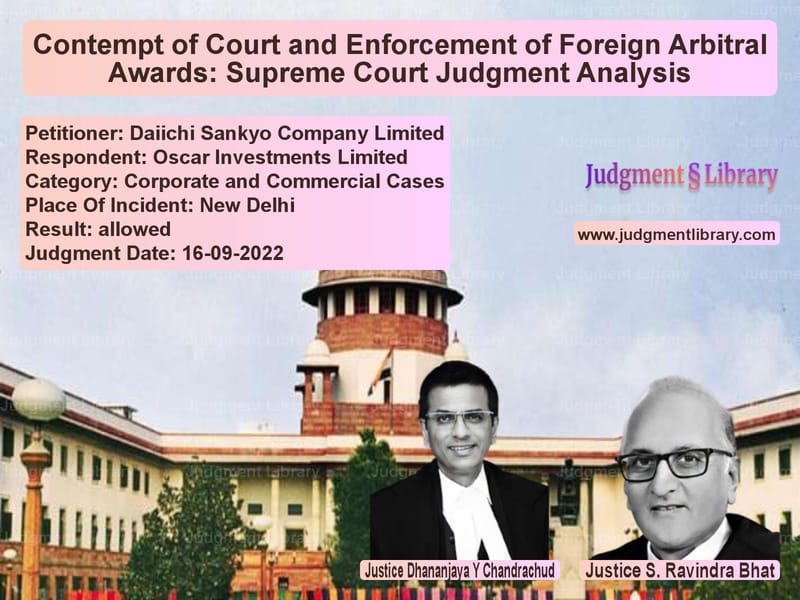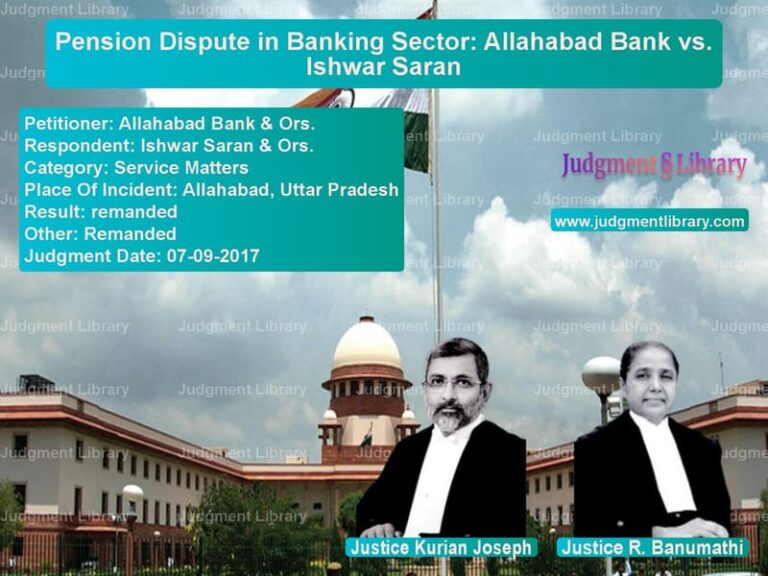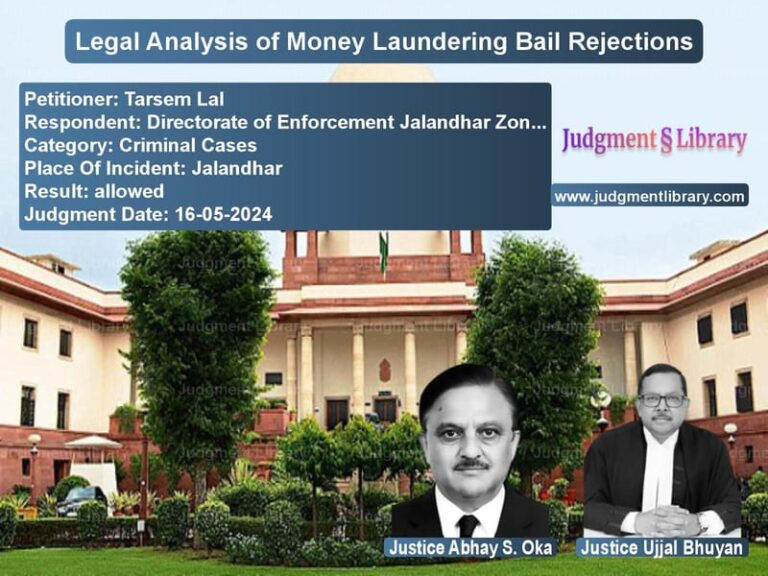Contempt of Court and Enforcement of Foreign Arbitral Awards: Supreme Court Judgment Analysis
This Supreme Court judgment addresses a contentious dispute regarding the enforcement of a foreign arbitral award between the parties, Daiichi Sankyo Company Limited (the petitioner) and Oscar Investments Limited (the respondent). The case also involves contempt petitions filed against the Singh Brothers, Malvinder Singh and Shivinder Singh, for their non-compliance with court orders. At the heart of the dispute is the execution of a pledge over the shares in Fortis Healthcare Limited and the violation of court orders by the Singh Brothers in connection with the transfer of assets to avoid satisfying the arbitral award.
The case primarily deals with two important aspects: the enforcement of foreign arbitral awards in India and the power of the courts to impose contempt charges for non-compliance with such awards. The Singh Brothers and other related entities were accused of taking actions that contravened the binding decisions of the arbitral tribunal, leading to serious legal consequences. The Court was tasked with deciding whether the respondents could avoid the enforcement of the award and whether they could be held in contempt for their actions.
Background of the Dispute
The petitioner, Daiichi Sankyo Company Limited, had obtained a foreign arbitral award against the respondent, Oscar Investments Limited, for an alleged breach of contract regarding the sale of shares in Fortis Healthcare Limited. The foreign arbitral tribunal had ruled in favor of Daiichi Sankyo and directed Oscar Investments to comply with certain financial obligations. However, the Singh Brothers, who were major stakeholders in Fortis Healthcare, allegedly took steps to obstruct the enforcement of this award by transferring assets and shares to evade compliance.
The case became complicated when the Singh Brothers and their associates filed multiple petitions to delay or avoid the execution of the arbitral award. The petitioner then moved the court, seeking the enforcement of the arbitral award and asking for the court’s intervention in holding the Singh Brothers in contempt for violating the earlier orders. The Enforcement Directorate and other investigative agencies were also involved in investigating the assets transferred in violation of court orders.
The key issue was whether the Singh Brothers had deliberately violated the court orders by transferring assets related to the pledged shares in Fortis Healthcare to avoid the obligations under the foreign arbitral award. The Court had to determine whether their actions amounted to contempt of court and whether such actions should result in sanctions and penalties.
Petitioner’s Arguments
The petitioner, Daiichi Sankyo, represented by its legal counsel, argued that the Singh Brothers had actively sought to frustrate the enforcement of the arbitral award by transferring shares and assets related to Fortis Healthcare, which were pledged as security for the outstanding financial obligations. The petitioner’s counsel contended that this amounted to a direct violation of the Court’s orders and the foreign arbitral award, and sought to hold the respondents in contempt for their actions.
The petitioner’s counsel pointed out that the arbitral award had been made in favor of Daiichi Sankyo and that the Singh Brothers were legally bound to comply with it. However, the Singh Brothers had attempted to transfer the shares in Fortis Healthcare Limited to evade the consequences of the arbitral award. The petitioner argued that such actions hindered the fair administration of justice and resulted in the unjust enrichment of the respondents at the expense of the petitioner.
The petitioner requested that the Court enforce the arbitral award and impose penalties on the respondents for contempt, emphasizing that the Singh Brothers’ actions undermined the judicial process and violated the binding nature of the arbitral award. The petitioner argued that the Court’s orders needed to be upheld to preserve the rule of law and ensure that foreign arbitral awards are enforced within India.
Respondent’s Arguments
The respondents, Oscar Investments Limited and the Singh Brothers, represented by their counsel, denied the allegations of contempt and argued that they had not violated the court’s orders. The respondents contended that they had acted in good faith and that there had been no deliberate effort to frustrate the enforcement of the arbitral award. They claimed that any transfer of assets or shares was done in compliance with the law and was not intended to evade the arbitral award.
The respondent’s counsel emphasized that the arbitral award, while binding, did not automatically guarantee the transfer of the shares or assets as the petitioner had claimed. The respondents also argued that the Court’s jurisdiction in such matters was limited, and that any actions taken by the Singh Brothers regarding the shares in Fortis Healthcare were within their rights, despite the ongoing arbitration process.
Additionally, the respondents’ counsel contended that the transfer of assets was conducted under legitimate circumstances, and that any changes in the ownership of the pledged shares were not done to circumvent the enforcement of the award. They argued that the petitioner’s claims of contempt were based on misinterpretations of the facts and should be dismissed by the Court.
Court’s Reasoning
The Supreme Court carefully examined the facts of the case, including the conduct of the Singh Brothers and the transfer of shares in Fortis Healthcare. The Court referred to various precedents regarding the enforcement of foreign arbitral awards in India and emphasized the legal obligation of parties to comply with such awards. The Court noted that when a foreign arbitral award is made in favor of a party, it is binding, and any actions that deliberately frustrate or impede the enforcement of the award constitute a violation of the court’s orders.
The Court observed that the actions of the Singh Brothers, including the transfer of shares and assets, raised serious concerns about their intentions. The Court held that these actions appeared to be deliberately undertaken to avoid the consequences of the arbitral award. The Court emphasized that such conduct could not be tolerated, as it undermined the integrity of the judicial process and violated the principles of fairness and justice.
The Court also highlighted the role of the Enforcement Directorate and other agencies in investigating the asset transfers. The Court referred to Section 51 of the Arbitration and Conciliation Act, which allows for the enforcement of foreign awards and the imposition of penalties for non-compliance. The Court concluded that the respondents’ actions amounted to contempt of court, as they had deliberately violated the court’s orders and the binding arbitral award.
Judgment
The Supreme Court ruled in favor of Daiichi Sankyo and held the respondents in contempt of court for their actions in obstructing the enforcement of the arbitral award. The Court directed the respondents to comply with the arbitral award immediately and ordered them to pay the outstanding amount along with interest at the rate prescribed by the tribunal.
The Court also imposed penalties on the respondents for their actions, including the transfer of pledged shares in Fortis Healthcare to avoid the payment obligations. The Court emphasized that contempt of court would not be tolerated, and that actions aimed at frustrating the enforcement of judicial orders would have serious consequences. The respondents were further directed to reverse the transfers of assets and shares, ensuring that the petitioner’s interests were protected.
The Court’s decision reinforced the principle that foreign arbitral awards must be treated with the same legal weight as domestic awards and that parties are legally bound to comply with the terms of such awards. The ruling also highlighted the importance of upholding the authority of the court and ensuring that contemptuous conduct is addressed through appropriate penalties.
Conclusion
This case underscores the importance of enforcing foreign arbitral awards and the legal obligations of parties involved in arbitration. The judgment demonstrates the Supreme Court’s commitment to ensuring that arbitral awards are not frustrated by parties seeking to evade their responsibilities. The decision also reaffirms the principle that contempt of court will not be tolerated, and that actions aimed at undermining the enforcement of judicial orders can result in significant legal consequences.
The Court’s ruling serves as a reminder that the integrity of the judicial process must be preserved, and that parties must honor the binding nature of arbitral awards, both domestic and foreign. This case sets an important precedent for the enforcement of foreign awards and the consequences of non-compliance, contributing to a stronger framework for arbitration in India.
Petitioner Name: Daiichi Sankyo Company Limited.Respondent Name: Oscar Investments Limited.Judgment By: Justice Dhananjaya Y Chandrachud, Justice S. Ravindra Bhat.Place Of Incident: New Delhi.Judgment Date: 16-09-2022.
Don’t miss out on the full details! Download the complete judgment in PDF format below and gain valuable insights instantly!
Download Judgment: daiichi-sankyo-compa-vs-oscar-investments-li-supreme-court-of-india-judgment-dated-16-09-2022.pdf
Directly Download Judgment: Directly download this Judgment
See all petitions in Arbitration Act
See all petitions in Commercial Arbitration
See all petitions in Arbitration Awards
See all petitions in Dispute Resolution Mechanisms
See all petitions in Enforcement of Awards
See all petitions in Judgment by Dhananjaya Y Chandrachud
See all petitions in Judgment by S Ravindra Bhat
See all petitions in allowed
See all petitions in supreme court of India judgments September 2022
See all petitions in 2022 judgments
See all posts in Corporate and Commercial Cases Category
See all allowed petitions in Corporate and Commercial Cases Category
See all Dismissed petitions in Corporate and Commercial Cases Category
See all partially allowed petitions in Corporate and Commercial Cases Category







